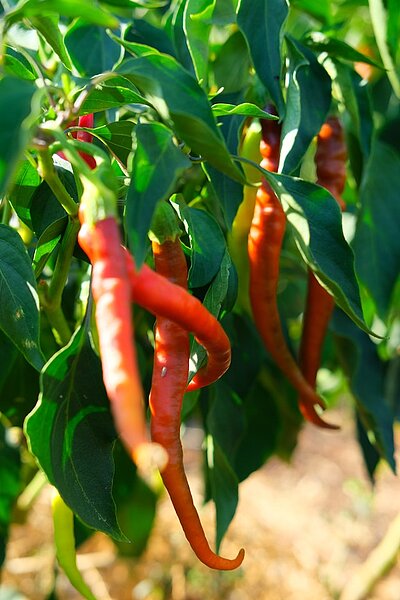Chili peppers

What are chili peppers?
Chili peppers are the fruits of plants of the Capsicum genus, which also includes peppers and chili peppers. There are many different varieties of chili peppers, which differ in shape, color, size and heat. Pungency is measured in Scoville units, which indicate how much capsaicin is contained in a chili pepper. For comparison: a bell bell pepper has 0 Scoville, a jalapeño has 2,500 to 8,000 Scoville and a habanero has 100,000 to 350,000 Scoville.
Capsaicin is a chemical compound that binds to certain receptors in the oral mucosa and sends a signal to the brain that there is something hot or painful in the mouth. The brain responds by releasing endorphins, which trigger a feeling of well-being. This explains why some people like spicy food.
Are chili peppers poisonous to dogs?
Chili peppers are not really poisonous to dogs, but they can be very unpleasant. Dogs have fewer taste buds than humans and are therefore less able to distinguish between different flavors. They mainly use their sense of smell to decide whether they want to eat something or not.
If your dog eats a chili pepper or a spicy food with chili powder, he will probably quickly realize that it was a bad idea. The capsaicin in chilies causes a strong burning sensation in the mouth and throat, which can lead to tearing, salivation, coughing, sneezing and gagging. It can also cause gastrointestinal complaints such as diarrhea, vomiting and abdominal pain.
Your dog's reaction depends on the amount and pungency of the chili pepper he has eaten. The more capsaicin he has ingested, the more severe the symptoms will be. Your dog's size and weight also play a role. A small dog is more likely to suffer from a chili pepper than a large dog.
What are the benefits of chili peppers for dogs?
Chili peppers also have some positive effects for dogs when given in very small quantities. Capsaicin also has anti-inflammatory, analgesic and antibacterial properties. It can therefore help with certain conditions such as arthritis, skin infections or toothache.
However, you should never give your dog chili peppers or other spicy foods without consulting your vet. The risks usually outweigh the benefits and there are other, safer ways to help your dog.
How can you help your dog if he has eaten chili peppers?
If your dog has accidentally eaten a chili pepper or spicy food, the first thing you should do is rinse his mouth. You can offer him water or milk to soothe the burning sensation. However, avoid ice cubes or cold drinks, as these can make the burning sensation worse.
Watch your dog closely afterwards and look for signs of discomfort. If he is salivating heavily, vomiting, has diarrhea or seems apathetic, you should take him to the vet. They can give him medication to treat the symptoms and prevent dehydration.
How can you prevent your dog from eating chili peppers?
The best way to prevent your dog from eating chili peppers is to keep them out of his reach. Keep spicy foods in sealed containers or in the fridge and don't leave any leftovers on the table or in the kitchen. If you cut chili peppers, wash your hands thoroughly afterwards and clean the cutting board and knife. Also make sure that your dog does not have access to the trash can where he could find chili peppers or other dangerous food.
If you want to give your dog something from your plate, make sure it doesn't contain chili peppers or other spices. There are many healthy and tasty snacks for dogs that you can offer him instead.
Chili peppers are not poisonous to dogs, but they can be very unpleasant. If your dog has eaten a chili pepper or spicy food, you should rinse his mouth and observe him. If he shows severe symptoms, take him to the vet. To prevent your dog from eating chili peppers, keep them safe and avoid giving him spicy foods.
Properties 2
Are you looking for other ingredients with a specific property?
Just click on them to find more.
If you notice any signs of hypersensitivity or poisoning in your dog, you should see your vet immediately. We are not a substitute for a vet, but we try to be as accurate as possible. Every dog reacts differently and we recommend you get a second opinion or consult your vet if in doubt.
Stay healthy and take good care of your four-legged friend!😊
Similar to Chili peppers
Jalapeños are medium-hot chili peppers that belong to the Capsicum annuum species. They are a staple food in Mexican cuisine and are enjoyed worldwide in both fresh and canned form. Jalapeños are...
Habaneros are one of the hottest chili varieties in the world. Originally from the Amazon region, they have found their way into kitchens around the world, especially in Latin America and the...
Cayenne pepper is a spice that comes from the Capsicum annuum plant. This plant belongs to the nightshade family and is related to peppers, tomatoes and potatoes. The fruits of the plant are called...
Chili powder is a spice that is made from dried and ground chili peppers. There are different types of chili peppers, which have different levels of heat. The pungency is determined by a substance...



